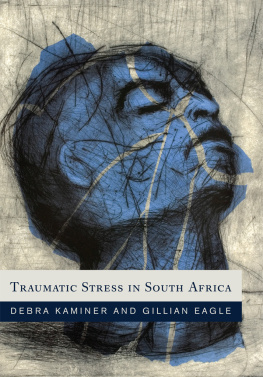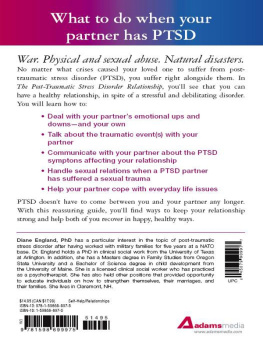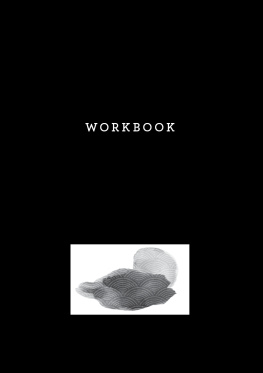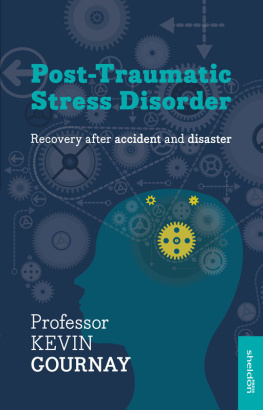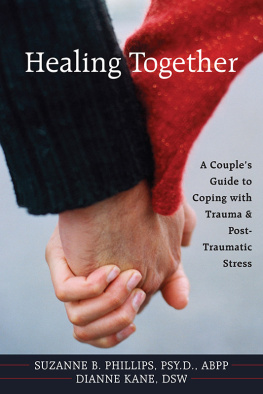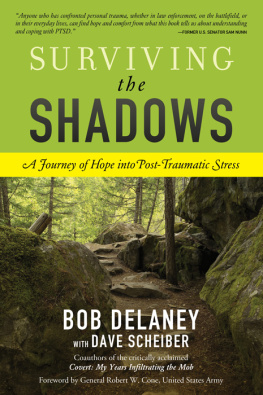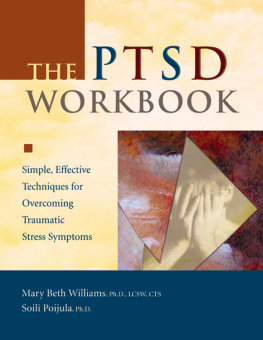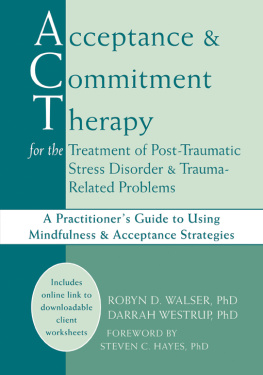Traumatic Stress in South Africa
Traumatic Stress in South Africa
Debra Kaminer and Gillian Eagle
Wits University Press
1 Jan Smuts Avenue
Johannesburg
2001
South Africa
http://witspress.ac.za
Debra Kaminer and Gillian Eagle, 2010
First published 2010
ISBN (print) 978-1-86814-509-6
ISBN (EPUB - IPG) 978-1-86814-836-3
ISBN (EPUB - ROW) 978-1-86814-837-0
ISBN (PDF) 978-1-86814-682-6
All rights reserved. No part of this publication may be reproduced, stored in a retrieval system, or transmitted in any form or by any means, electronic, mechanical, photocopying, recording or otherwise, without the written permission, except in accordance with the provisions of the Copyright Act, Act 98 of 1978.
Edited by Lara Jacob
Indexed by Ethn Clarke
Cover design by Hybridcreative
Layout by Manoj Sookai
Printed and bound by Creda Communications
Wits University Press has made every reasonable effort to locate, contact and acknowledge copyright owners. Please notify us should copyright not have been properly identified and acknowledged. Any corrections will be incorporated in subsequent editions of the book.
Cover: Blue Head, 1993 by William Kentridge
The authors are deeply grateful for the thoughtful and reflective comments provided by colleagues, friends and loved ones during the preparation of this book.
TABLE OF CONTENTS
LIST OF ABREVIATIONS AND ACRONYMS
| ANC | African National Congress |
| ASD | Acute Stress Disorder |
| BPP | Brief Psychodynamic Psychotherapy |
| CBT | Cognitive Behavioural Therapy |
| CIDI | Composite International Diagnostic Interview |
| CISD | Critical Incident Stress Debriefing |
| CPT | Cognitive Processing Therapy |
| CSVR | Centre for the Study of Violence and Reconciliation |
| CT | Cognitive Therapy |
| DESNOS | Disorders of extreme stress not otherwise specified |
| EA | Employee Assistance |
| EMDR | Eye Movement Desensitisation and Reprocessing |
| IFP | Inkatha Freedom Party |
| IRCT | International Rehabilitation Council for Torture Victims |
| MVAs | Motor vehicle accidents |
| NGOs | Non-governmental organisations |
| NLP | Neurolinguistic Programming |
| NPAT | National Peace Accord Trust |
| PE | Prolonged Exposure |
| PIE | Proximity, Immediacy and Expectancy |
| POWA | People Opposing Women Abuse |
| PSTD | Posttraumatic Stress Disorder |
| PTGI | Post Traumatic Growth Inventory |
| SADF | South African Defence Force |
| SANDF | South African National Defence Force |
| SASH | South African Stress and Health |
| SIT | Stress Inoculation Training |
| SSRIs | Selective serotonin reuptake inhibitors |
| TFT | Thought Field Therapy |
| TIR | Traumatic Incident Reduction |
| TRC | Truth and Reconciliation Commission |
| VKD | Visual Kinaesthetic Dissociation |
Chapter 1
INTRODUCTION
T he aim of this book is to address the pressing and socially relevant topic of traumatic stress in South Africa. Given the high levels of exposure to trauma and violence of various kinds in this country, there is naturally serious concern about the mental health impact and implications of this exposure.
South African citizens are widely and commonly confronted with anecdotal accounts of traumatic events, both in the course of their everyday lives and in the mass media, often articulated in the discourse of living in a dangerous and traumatised society. Along with this awareness of the frequent occurrence of trauma is a preoccupation with its psychological consequences. The notion of posttraumatic stress has entered the public domain to the extent that this terminology is in common usage and is even used to describe the state of characters in popular local television dramas or soap operas. It is also noticeable that in media accounts of traumatic events there are frequently references to the fact that victims are receiving debriefing or counselling, suggesting that trauma intervention is offered by many practitioners of various levels of skill to large numbers of trauma survivors, with an assumption that such intervention should take place as a matter of course. The increasing awareness of and prominence given to posttraumatic stress conditions and related interventions has had benefits and costs. Although the public may be better informed about some aspects of traumatic stress and victims may more readily access and seek assistance, there are also misconceptions and problematic practices. Common sense or folkloric knowledge of traumatic stress can easily become dated, distorted or misinterpreted. Access to up-to-date, well substantiated and clearly presented information about traumatic stress is important at this point in time, both in terms of doing justice to the international advancements in traumatic stress knowledge and in terms of improving everyday practices in South Africa. In response to this need, this book presents an overview of aspects of trauma prevalence, impact and treatment that is intended to be both scholarly and accessible. This text aims to be mindful of the complexities of working with trauma survivors living within a context of multiple dangers.
Although the term trauma is often associated with medical conditions, as in physical trauma to the body, this book focuses on psychological trauma or trauma to the psyche. The origin of the word trauma lies in a Greek word meaning to tear or to puncture. In the case of psychological trauma this understanding is reflected in a notion of psychological wounding and the penetration of unwanted thoughts, emotions and experiences into the psyche or being of the person. Traumatic experiences are usually unanticipated and by definition place excessive demands on peoples existing coping strategies. Thus traumatic events create severe disruptions to many aspects of psychological functioning.
The term trauma has been used to refer both to stimuli of a catastrophic nature (the assault was a trauma in her life) and to the severe distress produced by such an event (she experienced trauma as a consequence of the assault), and in this book it is similarly used to refer to both events and responses. As will become clearer in the later discussion of the impact of trauma, this dual meaning perhaps makes sense when one appreciates that trauma is characterised by the coupling of a dreadful experience with a subjective experience of dread the outcome and its cause are inextricably intertwined. In this respect traumatic stress is a very specific type of stress, distinguishable from other forms of stress by the severity of both the stressor and the response. The study of traumatic stress is a distinct field of theory and research with some overlap with the stress field, but with a largely independent conceptual base and orientation. The field of traumatic stress (or traumatology as it is sometimes referred to) encompasses a broad range of issues and has generated a substantial body of psychological writing, particularly since the 1970s, with ever-widening interest.

